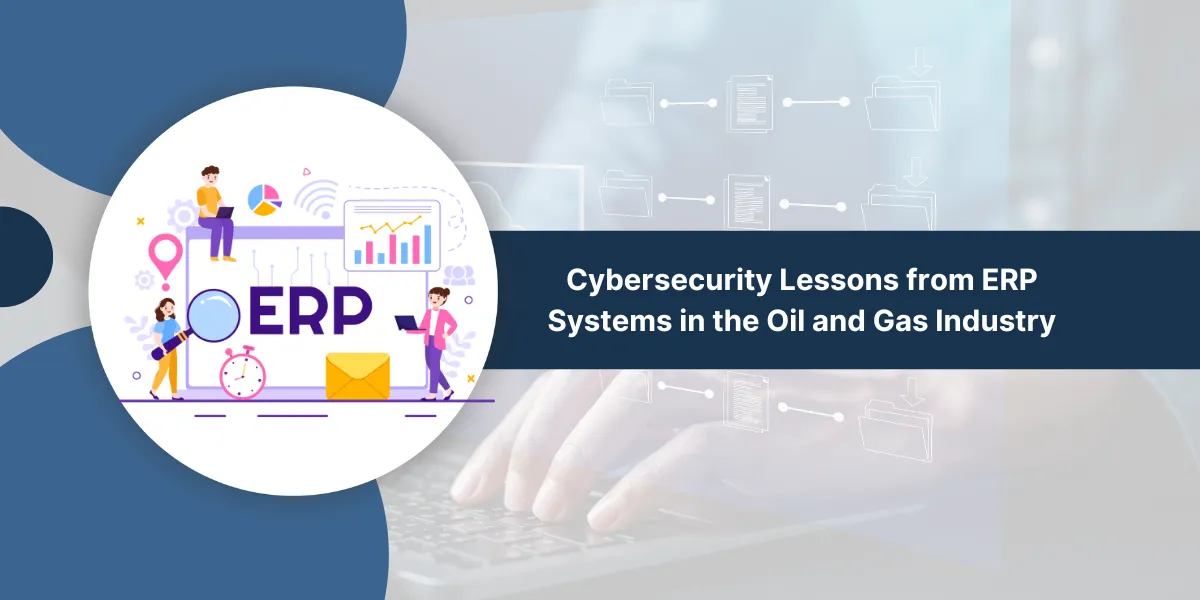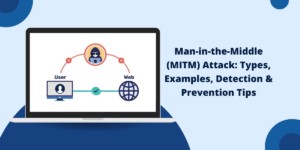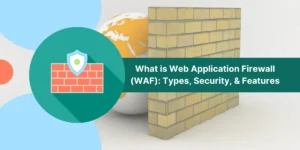When cybersecurity comes up, ERP systems might not be top of mind. But if you work in oil and gas, you know the day-to-day isn’t ordinary—there are miles of pipelines, complex supply chains, and nonstop pressure to keep everything running. With all that going on, staying ahead of cyber threats becomes not just a priority, but a necessity. And that’s exactly where ERP systems step in.
As oil and gas companies embrace digital tools—tracking assets remotely, managing global operations in real time—the risks grow along with the rewards. A weak password or one sneaky phishing email can set off a cascade of issues. But ERP systems, when thoughtfully implemented, act like digital watchdogs. They monitor trouble, secure access, and give your cybersecurity team the visibility it needs to catch small issues before they become big problems.
Here’s what ERP brings to the cybersecurity table:
- Detect suspicious activity before it causes harm
- Locks down access with multiple layers of authentication
- Keeps track of everything for compliance and audits
So, while ERP might traditionally be known for streamlining operations, in today’s world, it’s just as valuable for protecting them.
Why ERP Belongs in Your Cybersecurity Game Plan
Let’s be honest—cyberattacks are no longer a “what if” scenario. For oil and gas companies, they’re an everyday concern. From field sensors to finance departments, every part of the network is a potential target.
That’s where ERP comes in. It pulls everything together—data, people, systems—under one secure roof. Instead of scattered alerts and siloed systems, your team gets a single view of what’s happening, where, and why.
ERP platforms can help you:
- Control who sees what—and when
- Spot red flags with real-time alerts
- Stay ahead of audits and regulatory checks
It’s like having a built-in safety net that kicks in before things get out of hand.
What to Look for in a Secure ERP System
ERP systems are not all created equal. If cybersecurity is a concern (and let’s be real—it should be), then you’ll want to dig deep into what each platform offers.
Does it encrypt your data? Does it flag unusual user behavior? Can it cope with your needs? If a vendor can’t answer those questions clearly, it might be worth looking elsewhere.
Focus on features like:
- Data encryption everywhere—storage and transit
- Permission controls that match each role
- Smart alerts that catch anomalies early
A good ERP system won’t just keep up with your business, it’ll keep you one step ahead of emerging threats.
Compliance Doesn’t Have to Be a Headache
Audits and compliance reports might not be exciting, but they’re necessary—and often stressful. ERP systems make that part a whole lot easier.
Instead of digging through logs or spreadsheets, compliance officers can log into a dashboard and see the full picture. Every access point, every change, every transaction—it’s all there, neatly logged and ready to go.
ERP tools simplify your compliance process:
- Auto-generate reports for regulators
- Keep detailed logs with zero hassle
- Set custom rules to prevent risky access
With everything in one place, your team can prepare faster, respond better, and feel more confident when the auditors come calling.
Responding to Incidents—Without the Panic
Imagine a cyberattack hitting your monitoring system. What happens next? If you’re relying on separate tools and emails to coordinate a response, you’re already behind.
ERP systems help bring order to the chaos. They send alerts to the right people, assign tasks automatically, and track everything in real time. So even if it’s a worst-case scenario, your response is calm, coordinated, and quick.
ERP helps you respond faster by:
- Notifying the right teams immediately
- Kicking off pre-planned incident workflows
- Logging the full event for post-analysis
In short, ERP gives your team room to think, act, and solve the problem—without losing valuable time.
Securing the Cloud with ERP + CSPM
As more oil and gas companies move ERP to the cloud, they’re also opening up new security risks. That’s where Cloud Security Posture Management (CSPM) comes in.
CSPM tools work with ERP systems to scan your cloud setup for mistakes—like public data exposure or weak settings—and fix them before bad actors find them.
Why CSPM matters with ERP:
- Catches risky configurations early
- Ensure compliance stays intact
- Adds a continuous security layer
It’s like a 24/7 security guard, but smarter—and without coffee breaks.
Train Your Team Like They’re Part of the Defense Team (Because They Are)
No matter how good your tech is, people can still be the weakest link. That’s why ERP security training needs to be part of everyone’s job—not just IT.
Train your employees to spot phishing attempts. Teach managers how to set proper access controls. Run simulations so they know what a real attack looks like.
Best practices for ERP user training:
- Keep sessions short and specific
- Update content as threats evolves
- Use real-life examples they can relate to
When everyone understands their role in security, your whole organization becomes more resilient.
Get Ahead of Threats with Smarter Detection
ERP systems today aren’t just about processing transactions. They’re also about watching for trouble.
With the help of AI and behavioral analytics, ERP platforms can flag actions that don’t look normal—whether it’s someone logging in at odd hours or unexpected spending spikes.
Modern ERP security includes:
- Baseline behavior analysis
- Real-time alerts for outliers
- Automated responses to contain threats
The result? Your team gets the heads-up it needs—before something goes wrong.
Breaking Down Barriers Between IT and OT
Oil and gas companies often have two worlds: the digital (IT) side and the physical (OT) side. And those sides don’t always talk to each other.
ERP systems can help fix that. By integrating with control systems like SCADA, your ERP can spot equipment issues, launch maintenance tickets, and flag suspicious activity—all in one place.
This kind of integration means:
- Better coordination across departments
- Faster action on both digital and physical threats
- One unified view of what’s happening
When everyone sees the same picture, they make better, faster decisions.
The ROI of Secure ERP: Saving Time, Money, and Reputations
Investing in a secure ERP system isn’t just about protecting your business from the bad guys, it’s also about making a smart financial move. When security is woven into the system that powers your operations, you’re not only reducing the chance of expensive downtime or data breaches, you’re also saving time and money. Think of fewer late-night incidents, faster audits, and no more juggling five different tools that don’t sync up. A secure ERP simplifies things, keeps your team focused, and helps protect your bottom line while giving you peace of mind.
Here’s how a secure ERP pays off:
- Reduces incident recovery costs
- Minimizes downtime from attacks or errors
- Increase staff productivity with better tools and training
Security and efficiency aren’t separate goals, they go hand in hand when your ERP is working as it should.
Why Small and Mid-Sized Oil & Gas Firms Should Care Too
It’s easy to assume cybersecurity concerns are mostly for large, global enterprises. But smaller and mid-sized oil and gas companies are just as vulnerable—sometimes even more so. With fewer resources, limited in-house IT teams, and legacy systems still in use, attackers see these firms as low-hanging fruit.
Modern ERP platforms level the playing field. Many offer scalable pricing, built-in security features, and cloud deployment options that reduce the need for in-house infrastructure. In other words, you don’t need to be a giant to be secure, you just need to be smart about your systems.
For smaller firms, ERP offers:
- Centralized visibility with fewer tools to manage
- Simplified user controls and data protection
- Out-of-the-box compliance features
Security isn’t about size, it’s about strategy. And a well-chosen ERP system can give you an edge that’s both practical and powerful.
Final Thoughts: ERP Is More Than a Back-End System
Cybersecurity isn’t just a concern for the IT department anymore, it’s a whole-business issue. And ERP for oil and gas companies is one of the best tools to bring it all together.
It keeps your data safe. It supports compliance. It alerts you to threats. And it helps your team respond when every second counts.
If there’s one takeaway, it’s this:
- Don’t underestimate the security role of ERP
- Pick a platform that evolves with your business
- Invest in training and awareness
- Use integrations to stay agile and alert
ERP won’t stop every attack. But when configured with cybersecurity in mind, it will put you in a much stronger position to prevent them—and recover quickly if they happen.

Priya Mervana
 Verified Web Security Experts
Verified Web Security Experts
Priya Mervana is working at SSLInsights.com as a web security expert with over 10 years of experience writing about encryption, SSL certificates, and online privacy. She aims to make complex security topics easily understandable for everyday internet users.



